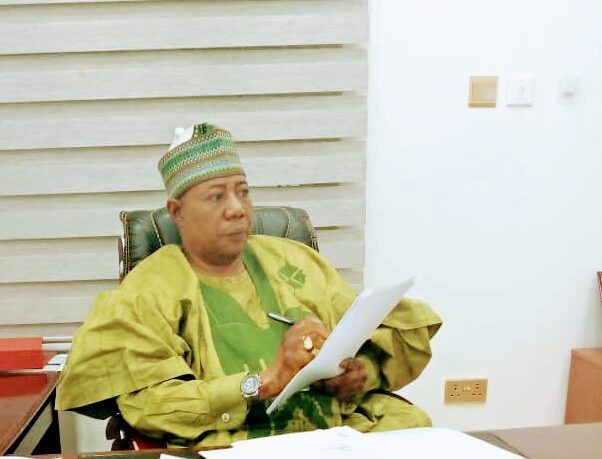Since taking office in 2015, both the actions and body language of President Muhammadu Buhari is unambiguous: “we should produce what we eat, and eat what we produce.” This mantra is premised on the belief that the hallmark of an independent nation is the ability to feed and fend for its population. Globally, food insecurity is seen as the greatest form of potent threat to peace and stability because, as the proverbial saying puts it, “a hungry man is an angry man.” In other words, someone deprived of a basic necessity will not be easily placated.
Against the backdrop of the foregoing, President Buhari, as a farmer himself, was convinced long before he became Nigerian president that the country cannot assert itself or even address the challenge of insecurity holistically if the issue of food security is not first addressed. Beyond just feeding its population, the agricultural sector is one of the critical non-oil sectors that are making significant contributions to the GDP. For instance, in the first and second quarter of 2021, Agriculture accounted for 22.35 and 23.78 per cent to the overall GDP. This was only made possible because of the doggedly targeted and deliberate government policies under the Buhari administration.
The president launched the Agricultural Promotion Policy (APP) which expired December 2020 to succeed the Agricultural Transformation Agenda policy launched in 2013 by his predecessor. Buhari’s APP was designed to ensure the provision of the required legislative and agricultural framework, macro policies, security, infrastructure and institutional mechanisms to allow farmers access essential inputs, finance, information, agricultural services and markets.
Being fully abreast of the place of farmers in Nigeria’s drive towards food security, President Buhari set out early in the life of his administration to encourage and adequately equip farmers with best inputs and opportunities to learn effective agronomic practices for improved yield. Since 2015, the Buhari government has invested substantially in agriculture, and the sector remains the biggest employer of labour in the country. A few months after assuming office, the Buhari-led government launched the Anchor Borrowers’ Programme (ABP) in November 2015 to boost agricultural production and reverse Nigeria’s negative balance of payments on food.
The programme targets those cultivating cereals (rice, maize, wheat etc.) cotton, roots and tubers, sugarcane, tree crops, legumes, tomato and livestock. Loans are disbursed to the beneficiary farmers through banks. Upon harvest, the farmers repay by taking their harvests to ‘anchors’ who pay the cash equivalent to their bank accounts. The good radiance of the government’s effort has been in rice and maize production, as data shows both increased significantly. This feat of high production between 2016 and 2020 has taken Nigeria to the first and second spots among rice paddy and maize producers in Africa respectively. With these developments, the Buhari government should not be blamed for the high cost of food. Rather, middlemen who are rapacious at making gains should be held responsible.
Stakeholders in the agric sector like Maize Growers, Processors and Marketers Association of Nigeria, and Rice Farmers Association of Nigeria have acknowledged the huge impact and attribute the rise in food production to investment in agriculture by the Buhari administration through the Anchor Borrowers’ Programme (ABP).
In 2020 alone, for instance, the ABP was able to empower over 150,000 farmers in advancing loans, inputs and cash to farmers. It also helped in advancing technology and mechanisation with a view to support smallholders’ farmers. Data from the Central Bank of Nigeria revealed that under the ABP, over 3.1 farmers have been financed so far.
Palm oil and cotton wool farmers have benefitted tremendously from the Buhari agric revolution. This was made possible because the president directed CBN to provide support to firms and individuals that wanted to expand the production of ten different commodities in Nigeria. The ten different products are rice, maize, cassava, tomatoes, cotton, oil palm, poultry, fish, and livestock dairy and cocoa. Since then, Nigeria has remained top on the list of countries producing palm oil, cotton and cassava. Overwhelmed by the president’s gesture towards them, the Oil Palm Growers Association of Nigeria (OPGAN) applauded Buhari and the CBN for empowering smallholder farmers under the Anchor Borrower Programme (ABP).
Another strategic initiative that has boosted Agriculture under Buhari is the Presidential Fertilizer Initiative (PFI), which was launched on December 14, 2017. So far, it has produced over 30 million bags of 50kg fertilizers in four years, according to the latest Nigeria Sovereign Investment Authority (NSIA) annual report.
Within the same period under review, the country’s fertilizer blending plants have increased from seven to over 50 functional plants located at different regions of the country.
Under President Buhari, Nigeria is having its best time in agriculture. Most profound of them all is the CBN’s Brown Revolution, which was launched in Kwall, Bassa local government area of Plateau State. The Intervention programme is aimed at enhancing food security, stability and boosting the wheat value chain under the Anchor Borrower Scheme. Before the Buhari agric revolution, Nigeria only produced about one per cent (63,000 metric tons) of the 5-6 million metric tons of the commodity consumed annually in the country.
What existed was an enormous demand-supply gap. In order to bridge the demand-supply gap and curtail the capital flight Nigeria is suffering as a result of more than $2 billion spent annually on wheat importation, the intervention became necessary as wheat was the second highest contributor to the country’s food import bill and given the high growth rate of the country’s population.
In the livestock subsector, the $1.3 billion annual dairy import bill has been a source of pain in the neck for Nigeria until the Buhari administration came up with the National Livestock Transformation Plan (LLSTP). The L-PRES is already facilitating the achievement of food security, reducing incessant conflict between farmers and herdsmen and cushioning the effect of a COVID-19 pandemic on the livestock industry in alignment with government’s strategies and policies.
It is also helping in the promotion of climate smart livestock production and productivity, expansion of rural economy for employment and income generation, promotion of exports and reduction in the importation of livestock and livestock products, as well as empowerment of women, youth, and vulnerable people.
Although the Nigeria Livestock subsector provides about 36.5 per cent of the total protein intake of Nigerians, it also contributes about 8-10 per cent of the agricultural GDP and 5 per cent of the National Gross Domestic Product. It has been a key contributor to poverty reduction, especially in rural areas. These statistics can be tremendously improved upon, with focused policy like NLSP.
-Ibrahim is director, Communications and Strategic Planning, of the Presidential Support Committee (PSC).
Virus-free. www.avast.com



